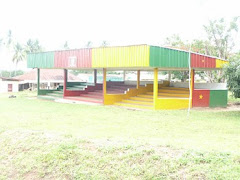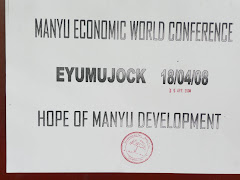A Christmas vacation in Cameroon is never complete without
breathing the dust and sometimes five hours or more driving to Mamfe. The
journey is often less tedious and void of Police and Gendarmerie check points
if you happen to use private instead of public transport. Based on past
experience, I will advise you to avoid the later if at all possible. If unlucky
to meet an overzealous officer, your vehicle could be grounded for hours and
even towed if the driver refuses to settle…. Thank God, on this sojourn, we
hired a private Toyota Carina and eventually made it from Kumba to Mamfe after
eight hours. The journey took a bit longer because of two flat tires. The first
occurred around Konye. The tire repair guy had it fixed and upon installation
found another puncture he could not mend – neither did he have a new tire for
sale. I asked him what was the
alternative, and he responded he could get it repaired the traditional way. I
looked at the guy sternly and told him to do whatever it takes. At this time we
had wasted almost two hours in Konye. He then said he will pour some garri
inside the tire and that will seal it after a few minutes. I gave him the green
light trusting his ingenuity and craftsmanship. Behold it worked and we took
off happily. However, his engineering only lasted less than an hour before we
heard an explosion and had to use our last spare tire.
We got to Nguti before nightfall and had to make a decision
whether to use the Obang road or the old road which according to informed
sources has since been graded. A
decision was made to take the Eyang/Bakebi route knowing if hell breaks loss,
we could catch a nap at Sesekou Ebini or Akwo’s Acha Mgbe and enjoy some
delicious goat pepper soup and fresh palm wine at either village. We hunkered
down the dusty winding road with deep potholes. You have to be an experienced
driver to ply these roads even during the dry season. It is very easy to get
blinded with dust from passing vehicles and finding yourself in a ditch on
attempt to escape a pothole. Since nightfall was fast approaching, we met very
few vehicles on the way and finally got to Bachou with a sigh of relief.
Driving from Bachou to Mamfe town made a big difference; it clearly spelled the
difference a good road makes as the rest of our journey took us less than
thirty minutes.
We happily arrived Okoyong on our way to Mamfe town and
drove past the newly built Council offices between Okoyong and Badi Bridge. The
building is quite impressive and worthy of a Municipality with two giant
statues depicting “the hard working Manyu woman with a load on her head
carrying a baby on the back”. The statue reminded me of our mothers, and how they
toiled for us carrying cassava just to make sure we went to school. The other
statue represented an Ekpe masquerade, the unquestioned symbol and pride of
Manyu governance and authority that has held the culture together for
centuries.
The euphoria and excitement of finally arriving our beloved
Mamfe town was suddenly short lived. We
noticed everywhere was dark and very little social activity in town. It dawned
on me before asking anyone that there was no light in the City. I proceeded to
my family abode and before I could ask for water to take off some of the dust,
I was told they haven’t had running water in over a month. I then reflected on
my childhood and asked myself, when this cycle of suffering will come to an end
for our people. How could they live for a month with no running water? I grew
up bathing and drinking the cross river due to acute shortage of pipe borne
water. After all these years, uncountable years, nothing has changed. The old
song keeps playing itself over and over again like a dream, no electricity, no
water and thus no economic activity in Mamfe town.
During the rest of my stay in Mamfe which lasted three days
with family and friends, I made an attempt to discuss the water crisis and to
find out what the authorities have done. According to the local inhabitants,
the water company has not been able to solve the problem and it may take
several more months. They have been told the cause is due to ageing
infrastructure of the water pumping equipment that has been in existence since
independence. The question is why has
this equipment not been earmarked for upgrade or gradual replacement? I equally made an attempt to visit the
Mayor’s office to inquire why the council cannot take over water distribution
in Mamfe. I was merely told it was impossible because the water in Mamfe has
been privatized and being managed by a Moroccan company. I truly doubt if this
is real privatization and if so, then the company will soon go out of business with
no income. For now, the water crisis in Mamfe remains with no quick solution in
sight.
Access to running water remains a crisis for the people of
Mamfe. With growing urbanization, there has to be political and economic
determination to ensure sustainable water resources based on social need.
Indeed, the water crisis in Mamfe has worsened and must be addressed by all stakeholders.
Water management is complex. It is considered a cross cutting resource because
it affects urban development, health, agriculture and leisure. With multiple stakeholders,
it has to be addressed on a territorial basis. Management of water services
requires high technical ability and adaptation to changing conditions. Some of
these conditions may require external funding because of the high cost of
infrastructure equipment and maintenance needs.
We as Manyu people and advocates for economic development
must not allow future generations to suffer the consequences of our inaction.
We cannot allow our people to continue in the 21st century with the
usual approach of managing our water crisis by doing nothing. We need to think
of making realistic assessments of our water management capabilities and show
unfailing commitment to equity. Maybe, just maybe, some political determination
or grass root pressure and advocacy may earn a listening ear. Finally, the
Manyu diaspora must find ways to understanding and implementing commonsense
solutions to problems that represent the long term economic security of our
people. Some of these solutions are around us, but we must dare to find them as
other communities have done for their people. It is time to act big and the
time is now.






























